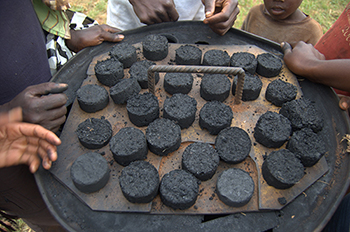In this section, Susan Murcott explains some of the unique features of D-Lab and the courses it offers.

D-Lab participants developed corn cob charcoal with collaborators in Zambia.
D-Lab, which comes under the umbrella of the Edgerton Center and is now in its 17th year, is an international development design center established to disseminate student- and staff-created innovations. D-Lab: Water, Climate Change, and Health is one of the many courses that D-Lab offers. Others include D-Lab: Development (the original D-Lab class) as well as courses on supply chains, schools, energy, field research, humanitarian innovation, gender and development, and water, sanitation, and hygiene. There’s also a relatively new smallholder agriculture course—one of the few courses in agriculture at MIT!—and the Terrascope design class, which focuses on design responses to complex environmental issues. All of these courses are informed by D-Lab’s distinctive emphasis on hands-on and project-based learning.
"All of these courses are informed by D-Lab’s distinctive emphasis on hands-on and project-based learning."
D-Lab classes are also remarkable for their diversity. D-Lab has an extraordinary (for MIT) number of women instructors, and a typical D-Lab class is a mixture of undergraduate and graduate students, along with one or two fellows, so we’ll have professionals in the classes as well. I really value that diversity. We have students from the MIT Sloan School of Management, and from the Department of Urban Studies and Planning, and often cross-enrolled students from Wellesley, Harvard, or Tufts. They all bring a richness to the class that I really welcome.










